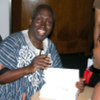
Okot P'Bitek (1931–1982)
Author of Song of Lawino / Song of Ocol
About the Author
One of the most eloquent crusaders for the decolonization of the African mind through confrontations with all manifestations of colonial mentality in African manners, fashion, spiritual values, and use of language, Okot p'Bitek wrote his only novel, Lak Tar Miyo Kinyero We Lobo (Are Your Teeth show more White, If So, Laugh) (1953), and his long satirical and humorous poems or "poetic novels" - Song of Lawino (1966), Song of Ocol (1970), The Song of a Prisoner (1971), and The Revelations of a Prostitute in his native Luo. He then produced English translations of the songs in order to be able to reach a wider audience. Born in Gulu, northern Uganda, Okot was educated at Gulu High School and King's College in Budo, Uganda, before proceeding to England in the mid-1950s, where he earned degrees from Bristol University, the University of Wales at Aberystwyth, and Oxford University. Before his premature death in 1980, Okot served as the director of the Uganda National Theatre, professor at the Makerere University at Kampala, writer-in-residence at the University of Iowa, and visiting professor at the University of Ife (now the Obafemi Awolowo University) at Ile-Ife, Nigeria. (Bowker Author Biography) show less
Works by Okot P'Bitek
Associated Works
Tagged
Common Knowledge
- Birthdate
- 1931-06-07
- Date of death
- 1982-07-20
- Gender
- male
- Nationality
- Uganda
- Birthplace
- Gulu, Uganda
- Place of death
- Kampala, Uganda
- Cause of death
- stroke
- Places of residence
- Kisumu, Kenya
Kampala, Uganda - Education
- King's College, Budo
University of Bristol
University of Wales, Aberystwyth
University of Oxford - Occupations
- poet
- Organizations
- Makerere University
University College, Nairobi
Members
Reviews
Lists
Awards
You May Also Like
Associated Authors
Statistics
- Works
- 14
- Also by
- 3
- Members
- 246
- Popularity
- #92,613
- Rating
- 3.9
- Reviews
- 5
- ISBNs
- 22
- Languages
- 4
- Favorited
- 2













